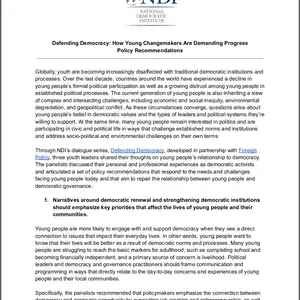The recent, rapid rise in the use of digital technology is changing relationships between citizens, organizations and public institutions, and expanding political participation. But while technology has the potential to amplify citizens’ voices, it must be accompanied by clear political goals and other factors to increase their clout.
Those are among the conclusions of a new NDI study, “Citizen Participation and Technology,” that examines the role digital technologies – such as social media, interactive websites and SMS systems – play in increasing citizen participation and fostering accountability in government. The study was driven by the recognition that better insights are needed into the relationship between new technologies, citizen participation programs and the outcomes they aim to achieve.
Using case studies from countries such as Burma, Mexico and Uganda, the study explores whether the use of technology in citizen participation programs amplifies citizen voices and increases government responsiveness and accountability, and whether the use of digital technology increases the political clout of citizens.
The research shows that while more people are using technology—such as social media for mobile organizing, interactive websites and text messaging systems that enable direct communication between constituents and elected officials or crowdsourcing election day experiences— the type and quality of their political participation—and therefore its impact on democratization—varies. It also suggests that, in order to leverage technology’s potential, there is a need to focus on non-technological areas such as political organizing, leadership skills and political analysis.
For example, the “2% and More Women in Politics” coalition led by Mexico’s National Institute for Women (INMUJERES) used a social media campaign and an online petition to call successfully for reforms that would allocate 2 percent of political party funding for women’s leadership training. Technology helped the activists reach a wider audience, but women from the different political parties who made up the coalition might not have come together without NDI’s role as a neutral convener.
The study provides an overview of NDI’s approach to citizen participation, and examines how the integration of technologies affects its programs to inform the work of NDI, other democracy assistance practitioners, donors, and civic groups.
The study was conducted with support from the National Endowment for Democracy.




